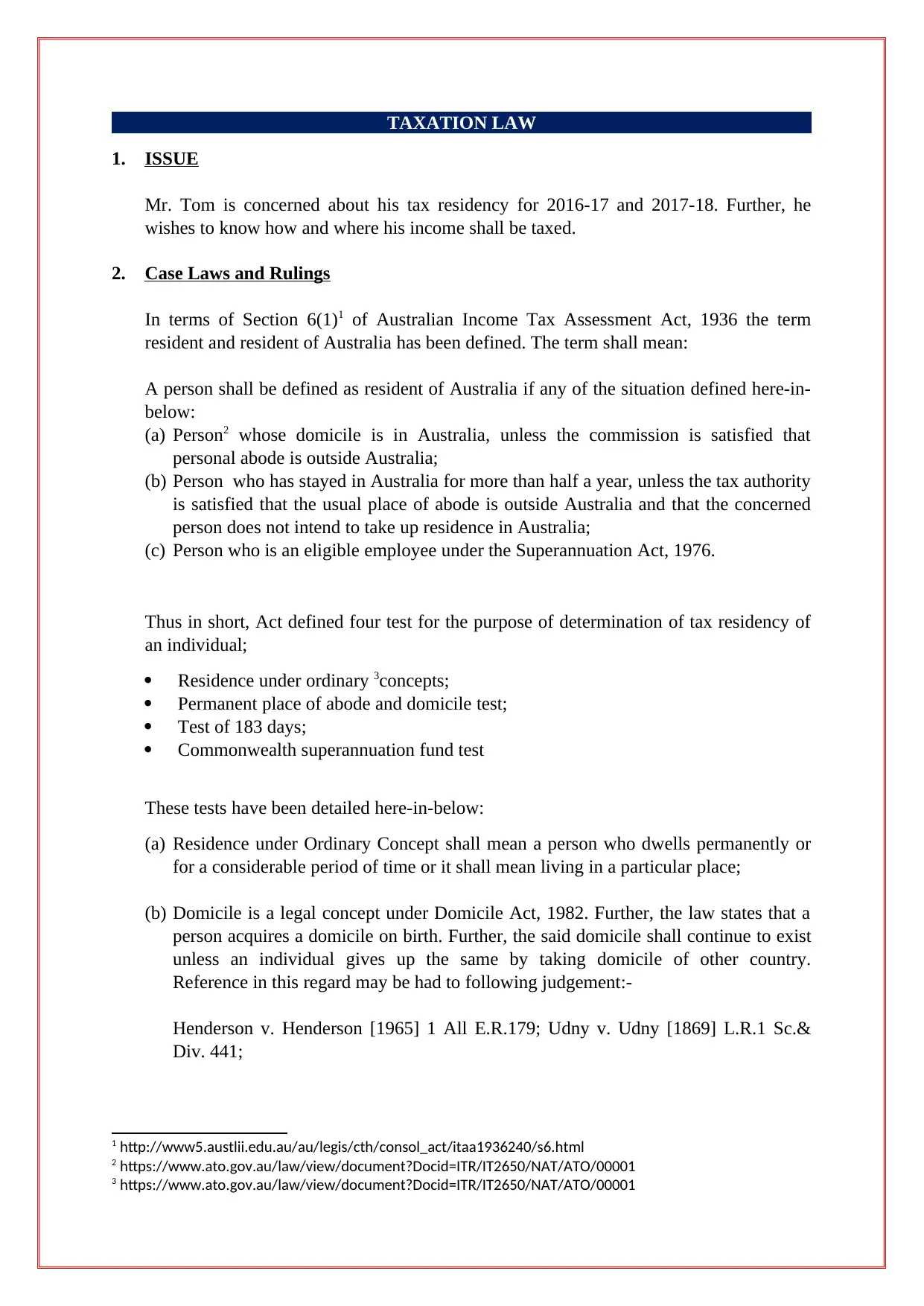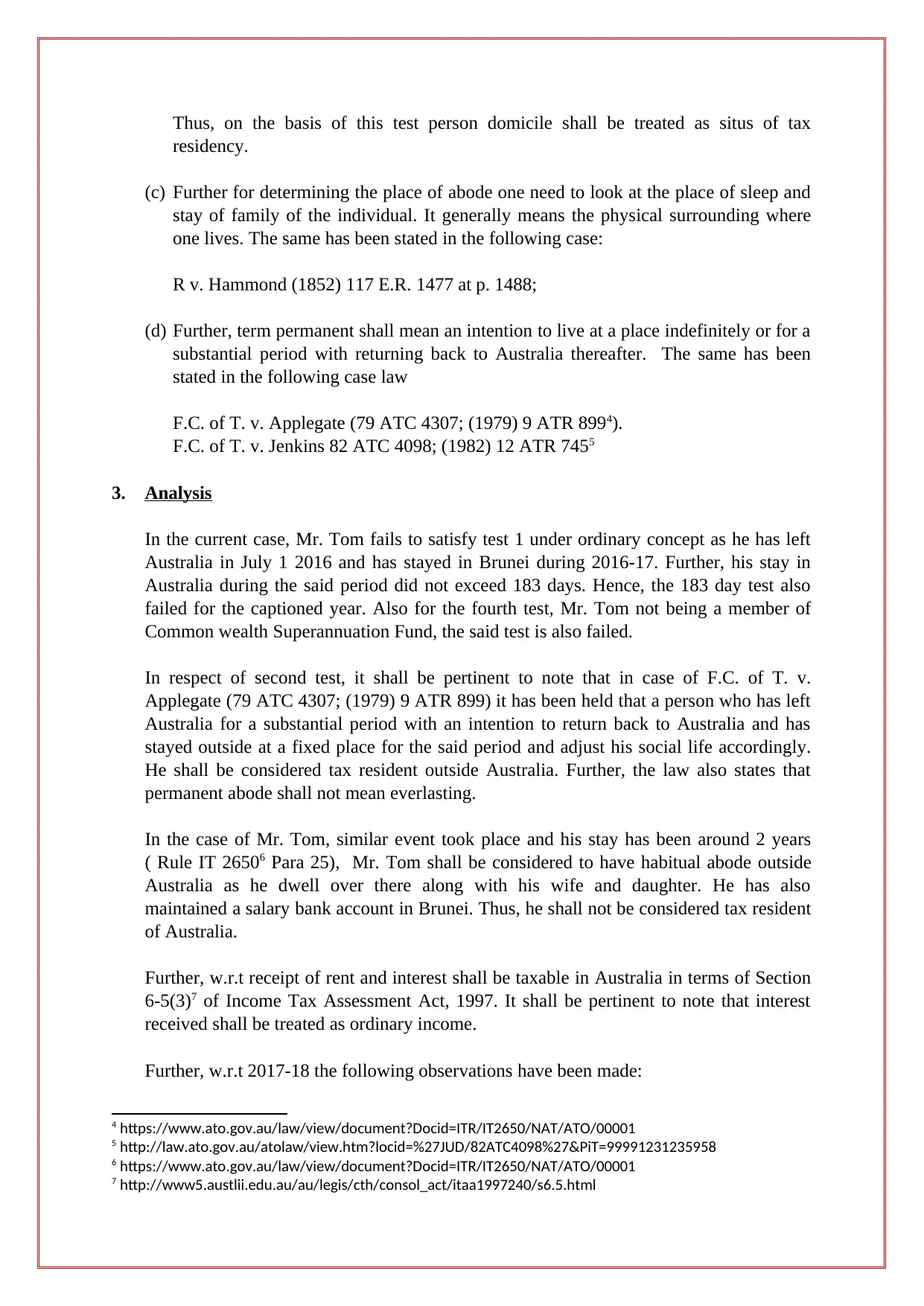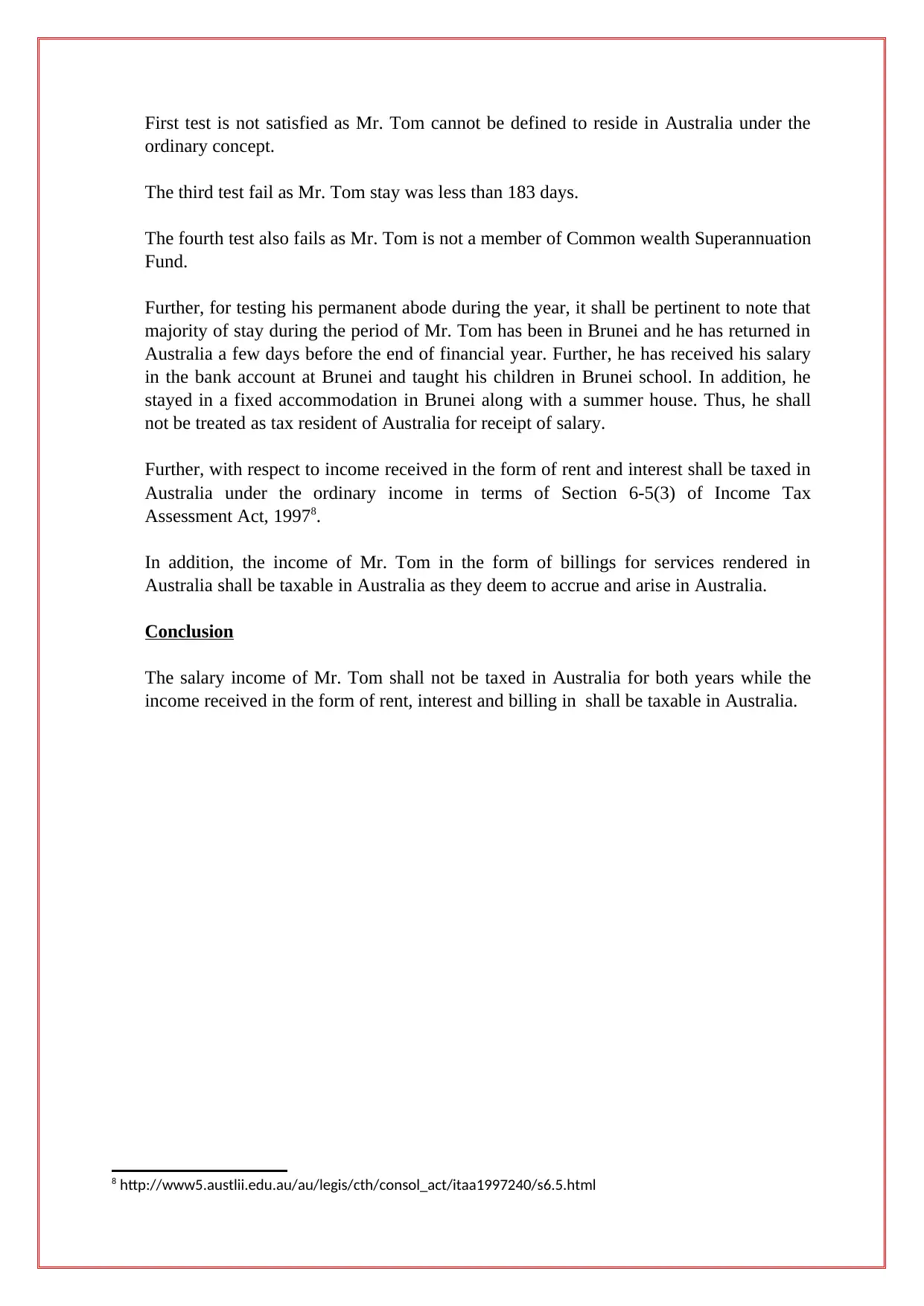Australian Tax Residency: Analysis of Mr. Tom's Tax Obligations
VerifiedAdded on 2023/06/08
|3
|1125
|121
Homework Assignment
AI Summary
This assignment analyzes Mr. Tom's tax residency status for the years 2016-17 and 2017-18, determining where his income is taxable. The analysis applies the tests outlined in the Australian Income Tax Assessment Act 1936, including the ordinary concepts of residence, domicile, the 183-day rule, and the Commonwealth superannuation fund test. The case examines Mr. Tom's situation, considering his time spent in Brunei, his domicile, place of abode, and sources of income such as rent, interest, and service billings. The conclusion states that Mr. Tom's salary income will not be taxed in Australia, while income from rent, interest, and billings for services rendered in Australia will be subject to taxation.

TAXATION LAW
1. ISSUE
Mr. Tom is concerned about his tax residency for 2016-17 and 2017-18. Further, he
wishes to know how and where his income shall be taxed.
2. Case Laws and Rulings
In terms of Section 6(1)1 of Australian Income Tax Assessment Act, 1936 the term
resident and resident of Australia has been defined. The term shall mean:
A person shall be defined as resident of Australia if any of the situation defined here-in-
below:
(a) Person2 whose domicile is in Australia, unless the commission is satisfied that
personal abode is outside Australia;
(b) Person who has stayed in Australia for more than half a year, unless the tax authority
is satisfied that the usual place of abode is outside Australia and that the concerned
person does not intend to take up residence in Australia;
(c) Person who is an eligible employee under the Superannuation Act, 1976.
Thus in short, Act defined four test for the purpose of determination of tax residency of
an individual;
Residence under ordinary 3concepts;
Permanent place of abode and domicile test;
Test of 183 days;
Commonwealth superannuation fund test
These tests have been detailed here-in-below:
(a) Residence under Ordinary Concept shall mean a person who dwells permanently or
for a considerable period of time or it shall mean living in a particular place;
(b) Domicile is a legal concept under Domicile Act, 1982. Further, the law states that a
person acquires a domicile on birth. Further, the said domicile shall continue to exist
unless an individual gives up the same by taking domicile of other country.
Reference in this regard may be had to following judgement:-
Henderson v. Henderson [1965] 1 All E.R.179; Udny v. Udny [1869] L.R.1 Sc.&
Div. 441;
1 http://www5.austlii.edu.au/au/legis/cth/consol_act/itaa1936240/s6.html
2 https://www.ato.gov.au/law/view/document?Docid=ITR/IT2650/NAT/ATO/00001
3 https://www.ato.gov.au/law/view/document?Docid=ITR/IT2650/NAT/ATO/00001
1. ISSUE
Mr. Tom is concerned about his tax residency for 2016-17 and 2017-18. Further, he
wishes to know how and where his income shall be taxed.
2. Case Laws and Rulings
In terms of Section 6(1)1 of Australian Income Tax Assessment Act, 1936 the term
resident and resident of Australia has been defined. The term shall mean:
A person shall be defined as resident of Australia if any of the situation defined here-in-
below:
(a) Person2 whose domicile is in Australia, unless the commission is satisfied that
personal abode is outside Australia;
(b) Person who has stayed in Australia for more than half a year, unless the tax authority
is satisfied that the usual place of abode is outside Australia and that the concerned
person does not intend to take up residence in Australia;
(c) Person who is an eligible employee under the Superannuation Act, 1976.
Thus in short, Act defined four test for the purpose of determination of tax residency of
an individual;
Residence under ordinary 3concepts;
Permanent place of abode and domicile test;
Test of 183 days;
Commonwealth superannuation fund test
These tests have been detailed here-in-below:
(a) Residence under Ordinary Concept shall mean a person who dwells permanently or
for a considerable period of time or it shall mean living in a particular place;
(b) Domicile is a legal concept under Domicile Act, 1982. Further, the law states that a
person acquires a domicile on birth. Further, the said domicile shall continue to exist
unless an individual gives up the same by taking domicile of other country.
Reference in this regard may be had to following judgement:-
Henderson v. Henderson [1965] 1 All E.R.179; Udny v. Udny [1869] L.R.1 Sc.&
Div. 441;
1 http://www5.austlii.edu.au/au/legis/cth/consol_act/itaa1936240/s6.html
2 https://www.ato.gov.au/law/view/document?Docid=ITR/IT2650/NAT/ATO/00001
3 https://www.ato.gov.au/law/view/document?Docid=ITR/IT2650/NAT/ATO/00001
Paraphrase This Document
Need a fresh take? Get an instant paraphrase of this document with our AI Paraphraser

Thus, on the basis of this test person domicile shall be treated as situs of tax
residency.
(c) Further for determining the place of abode one need to look at the place of sleep and
stay of family of the individual. It generally means the physical surrounding where
one lives. The same has been stated in the following case:
R v. Hammond (1852) 117 E.R. 1477 at p. 1488;
(d) Further, term permanent shall mean an intention to live at a place indefinitely or for a
substantial period with returning back to Australia thereafter. The same has been
stated in the following case law
F.C. of T. v. Applegate (79 ATC 4307; (1979) 9 ATR 8994).
F.C. of T. v. Jenkins 82 ATC 4098; (1982) 12 ATR 7455
3. Analysis
In the current case, Mr. Tom fails to satisfy test 1 under ordinary concept as he has left
Australia in July 1 2016 and has stayed in Brunei during 2016-17. Further, his stay in
Australia during the said period did not exceed 183 days. Hence, the 183 day test also
failed for the captioned year. Also for the fourth test, Mr. Tom not being a member of
Common wealth Superannuation Fund, the said test is also failed.
In respect of second test, it shall be pertinent to note that in case of F.C. of T. v.
Applegate (79 ATC 4307; (1979) 9 ATR 899) it has been held that a person who has left
Australia for a substantial period with an intention to return back to Australia and has
stayed outside at a fixed place for the said period and adjust his social life accordingly.
He shall be considered tax resident outside Australia. Further, the law also states that
permanent abode shall not mean everlasting.
In the case of Mr. Tom, similar event took place and his stay has been around 2 years
( Rule IT 26506 Para 25), Mr. Tom shall be considered to have habitual abode outside
Australia as he dwell over there along with his wife and daughter. He has also
maintained a salary bank account in Brunei. Thus, he shall not be considered tax resident
of Australia.
Further, w.r.t receipt of rent and interest shall be taxable in Australia in terms of Section
6-5(3)7 of Income Tax Assessment Act, 1997. It shall be pertinent to note that interest
received shall be treated as ordinary income.
Further, w.r.t 2017-18 the following observations have been made:
4 https://www.ato.gov.au/law/view/document?Docid=ITR/IT2650/NAT/ATO/00001
5 http://law.ato.gov.au/atolaw/view.htm?locid=%27JUD/82ATC4098%27&PiT=99991231235958
6 https://www.ato.gov.au/law/view/document?Docid=ITR/IT2650/NAT/ATO/00001
7 http://www5.austlii.edu.au/au/legis/cth/consol_act/itaa1997240/s6.5.html
residency.
(c) Further for determining the place of abode one need to look at the place of sleep and
stay of family of the individual. It generally means the physical surrounding where
one lives. The same has been stated in the following case:
R v. Hammond (1852) 117 E.R. 1477 at p. 1488;
(d) Further, term permanent shall mean an intention to live at a place indefinitely or for a
substantial period with returning back to Australia thereafter. The same has been
stated in the following case law
F.C. of T. v. Applegate (79 ATC 4307; (1979) 9 ATR 8994).
F.C. of T. v. Jenkins 82 ATC 4098; (1982) 12 ATR 7455
3. Analysis
In the current case, Mr. Tom fails to satisfy test 1 under ordinary concept as he has left
Australia in July 1 2016 and has stayed in Brunei during 2016-17. Further, his stay in
Australia during the said period did not exceed 183 days. Hence, the 183 day test also
failed for the captioned year. Also for the fourth test, Mr. Tom not being a member of
Common wealth Superannuation Fund, the said test is also failed.
In respect of second test, it shall be pertinent to note that in case of F.C. of T. v.
Applegate (79 ATC 4307; (1979) 9 ATR 899) it has been held that a person who has left
Australia for a substantial period with an intention to return back to Australia and has
stayed outside at a fixed place for the said period and adjust his social life accordingly.
He shall be considered tax resident outside Australia. Further, the law also states that
permanent abode shall not mean everlasting.
In the case of Mr. Tom, similar event took place and his stay has been around 2 years
( Rule IT 26506 Para 25), Mr. Tom shall be considered to have habitual abode outside
Australia as he dwell over there along with his wife and daughter. He has also
maintained a salary bank account in Brunei. Thus, he shall not be considered tax resident
of Australia.
Further, w.r.t receipt of rent and interest shall be taxable in Australia in terms of Section
6-5(3)7 of Income Tax Assessment Act, 1997. It shall be pertinent to note that interest
received shall be treated as ordinary income.
Further, w.r.t 2017-18 the following observations have been made:
4 https://www.ato.gov.au/law/view/document?Docid=ITR/IT2650/NAT/ATO/00001
5 http://law.ato.gov.au/atolaw/view.htm?locid=%27JUD/82ATC4098%27&PiT=99991231235958
6 https://www.ato.gov.au/law/view/document?Docid=ITR/IT2650/NAT/ATO/00001
7 http://www5.austlii.edu.au/au/legis/cth/consol_act/itaa1997240/s6.5.html

First test is not satisfied as Mr. Tom cannot be defined to reside in Australia under the
ordinary concept.
The third test fail as Mr. Tom stay was less than 183 days.
The fourth test also fails as Mr. Tom is not a member of Common wealth Superannuation
Fund.
Further, for testing his permanent abode during the year, it shall be pertinent to note that
majority of stay during the period of Mr. Tom has been in Brunei and he has returned in
Australia a few days before the end of financial year. Further, he has received his salary
in the bank account at Brunei and taught his children in Brunei school. In addition, he
stayed in a fixed accommodation in Brunei along with a summer house. Thus, he shall
not be treated as tax resident of Australia for receipt of salary.
Further, with respect to income received in the form of rent and interest shall be taxed in
Australia under the ordinary income in terms of Section 6-5(3) of Income Tax
Assessment Act, 19978.
In addition, the income of Mr. Tom in the form of billings for services rendered in
Australia shall be taxable in Australia as they deem to accrue and arise in Australia.
Conclusion
The salary income of Mr. Tom shall not be taxed in Australia for both years while the
income received in the form of rent, interest and billing in shall be taxable in Australia.
8 http://www5.austlii.edu.au/au/legis/cth/consol_act/itaa1997240/s6.5.html
ordinary concept.
The third test fail as Mr. Tom stay was less than 183 days.
The fourth test also fails as Mr. Tom is not a member of Common wealth Superannuation
Fund.
Further, for testing his permanent abode during the year, it shall be pertinent to note that
majority of stay during the period of Mr. Tom has been in Brunei and he has returned in
Australia a few days before the end of financial year. Further, he has received his salary
in the bank account at Brunei and taught his children in Brunei school. In addition, he
stayed in a fixed accommodation in Brunei along with a summer house. Thus, he shall
not be treated as tax resident of Australia for receipt of salary.
Further, with respect to income received in the form of rent and interest shall be taxed in
Australia under the ordinary income in terms of Section 6-5(3) of Income Tax
Assessment Act, 19978.
In addition, the income of Mr. Tom in the form of billings for services rendered in
Australia shall be taxable in Australia as they deem to accrue and arise in Australia.
Conclusion
The salary income of Mr. Tom shall not be taxed in Australia for both years while the
income received in the form of rent, interest and billing in shall be taxable in Australia.
8 http://www5.austlii.edu.au/au/legis/cth/consol_act/itaa1997240/s6.5.html
⊘ This is a preview!⊘
Do you want full access?
Subscribe today to unlock all pages.

Trusted by 1+ million students worldwide
1 out of 3
Related Documents
Your All-in-One AI-Powered Toolkit for Academic Success.
+13062052269
info@desklib.com
Available 24*7 on WhatsApp / Email
![[object Object]](/_next/static/media/star-bottom.7253800d.svg)
Unlock your academic potential
Copyright © 2020–2025 A2Z Services. All Rights Reserved. Developed and managed by ZUCOL.





